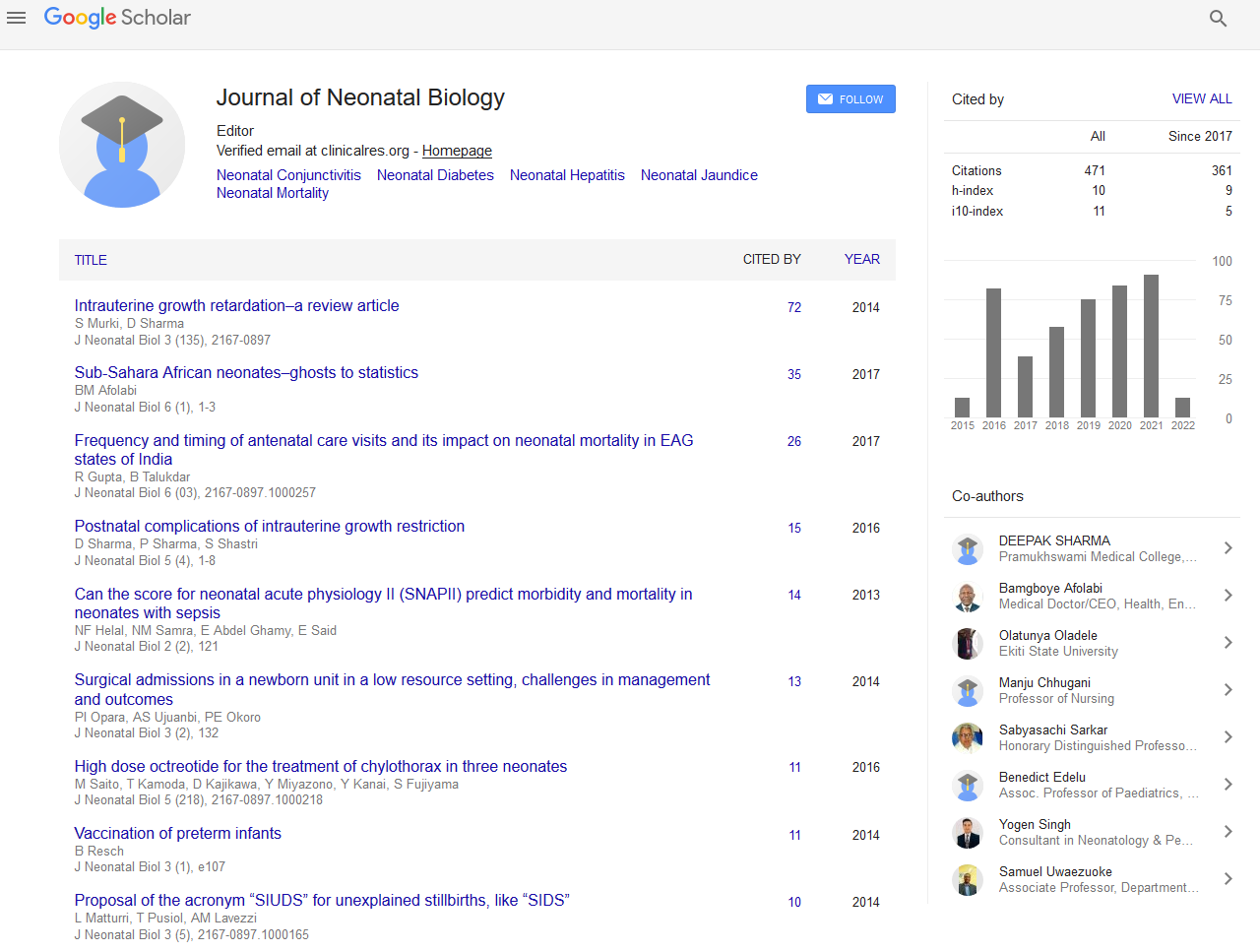PMC/PubMed Indexed Articles
Indexed In
- Genamics JournalSeek
- RefSeek
- Hamdard University
- EBSCO A-Z
- OCLC- WorldCat
- Publons
- Geneva Foundation for Medical Education and Research
- Euro Pub
- Google Scholar
Useful Links
Share This Page
Journal Flyer

Open Access Journals
- Agri and Aquaculture
- Biochemistry
- Bioinformatics & Systems Biology
- Business & Management
- Chemistry
- Clinical Sciences
- Engineering
- Food & Nutrition
- General Science
- Genetics & Molecular Biology
- Immunology & Microbiology
- Medical Sciences
- Neuroscience & Psychology
- Nursing & Health Care
- Pharmaceutical Sciences
Brain injury, early brain imaging and neurodevelopmental outcome in term newborns exposed to chorioamnionitis who demonstrate systemic inflammation by funisitis
9th International Conference on Neonatology and Pediatric Neurology
November 28-30, 2016 Valencia, Spain
Lakshmi D Katikaneni
Medical University of South Carolina, USA
Scientific Tracks Abstracts: J Neonatal Biol
Abstract:
Introduction: Chorioamnionitis is associated with white matter injury (WMI) in animal models. MRI diffusion metrics (MRIDM) may serve as early biomarkers of neonatal WMI in chorioamnionitis. Additionally, MR spectroscopy (MRS), used to quantify metabolites in specific neural regions, has been shown to be predictive of long-term developmental testing. Objective: The purpose of the study was to determine the utility of MRS and MRI-DM markers arising from different brain regions as indicators of global brain injury in term newborns exposed to chorioamnionitis and confirmed funisitis. Design/Methods: MRI-DM was performed on 25 term infants at 39-42 weeks GA at time of MR imaging with confirmed funisitis at birth. The ROI in OR (optic radiation) was quantitatively assessed for fractional anisotropy (FA) and mean diffusivity (MD) using MRICRON software. MRS metabolites were quantified at TE 30 & 270 in the basal ganglia (BG) and frontal white matter. Sixteen (16) infants had useable MRI-DM and MRS, which were correlated with a Pearson test. Results: Left OR FA was found to be negatively correlated with lactate/NAA (R=-0.65, p=0.0066) and Lactate/Creatine (R=-0.64, p=0.008) in the basal ganglia. Conclusions: Lactate/NAA has previously demonstrated better diagnostic accuracy than conventional MRI as in neonates with high lactate/NAA values predicting lower motor scores. The correlation of this ratio to the optic radiations, which undergo myelination shortly after birth, present two clinically applicable biomarkers for global WMI while, also, allowing insight into how chorioamnionitis affects and acts to delay development. Thus, early brain injury is detected by brain scans and early intervention is possible in those with abnormal brain biomarkers as noted in the current study.
Biography :
Lakshmi D Katikaneni has been a Neonatologist and NICU Graduate follow up Clinic Director for the past 30+ years and has a number of national and international presentations and publications related to nutrition, body composition and body fat measurements of preterm infants, brain and neuroinflammation markers, fetal drug exposure and hair analysis for cocain metabolites, retinopathy of prematurity and Avastin therapy, and sleep apnea issues in preterm infants. She is a Member of Pediatric Research Society, American Academy of Pediatrics, Brighton collaboration for vaccination issues as well as harmonized safety monitoring of immunization in pregnancy organized through GAIA project.
Email: katikalm@musc.edu


